by Michael | Apr 17, 2018 | Blog
Love it or hate it, social media are here to stay. But how much of a role should they play in a wedding and in the build-up?
OK, so I’m an ageing civil celebrant, not some tech-savvy teenager! However, I do have a few thoughts on this subject that might be useful.
Engagement/wedding
However tempting it may be, resist posting the good news of your engagement or wedding date on Facebook (or wherever) until you’ve told all your family and close friends first. It’s a common-sense, tactful thing. If you ignore that, you may end up causing a lot of offence.
Invitations
There’s nothing wrong with using social media for your invitations (e-vites) – it’s a lot cheaper than printed invitations and can still look good. (If you have a teenager in tow, they may design a fabulous invitation for you !) (You can always send printed invitations to your more conservative friends/relatives, if you choose.)
Invitation replies
You need to be able to track the replies, so you have to be consistent and clear. It may be best not to use social media here (not [quite] everyone has a Facebook account, for example). E-mail is probably safe, but technological problems are not unknown! What if your computer dies? Thus snail mail may be the best bet. So, ensure your address is on the invitation, even if the invitation is sent via social media.
The big event
It pays to communicate with your guests. Especially if you have special wishes.
You may well be happy with a photography free-for-all. That’s fine. If you want no photography during the ceremony, however, you can put a note in the programme or post this fact on the wedding website. Most – if not all – people will respect your wishes. ‘Unplugged’ weddings are becoming increasingly common nowadays.
Hopefully, guests who do take shots regardless will, at least, not post these for a few days. (It’s best to go with the flow, if people disregard your request – it’s not worth letting their lack of consideration spoil your big day.)
Of course, people should be welcome to take photos of themselves, if they want. You may set up photo opportunities for guests at the end of the ceremony (eg signing the register).
Afterwards
Do send out ‘thank you cards’ – but not by e-mail or social media. They’ve got to be hand-written.
So use social media to help you, by all means, but be tactful and considerate about it.
And if you’re looking for a non-tech-savvy person of more mature years to put together and conduct a truly magnificent ceremony, I think we know somebody who might fit the bill!
Visit www.shawprograms.co.uk for help planning your event (see photo).
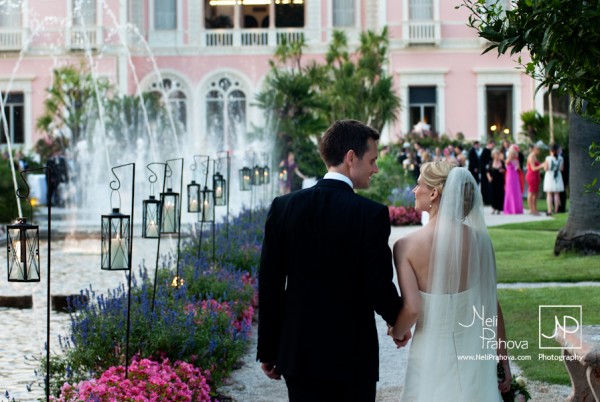
by Michael | Apr 17, 2018 | Blog
So your mind is on your approaching big day? The wedding ceremony is crucial (but you will be in safe hands with your civil celebrant).
However, once that part is over, what happens next?
Don’t fret! If you have hired a toastmaster, they will advise you. As should your (or the venue’s) Event Planner. However, you’ve arrived at my blog and I can offer you a guide to put your mind at ease.
Arrival
You may form part of a receiving line to greet the guests. It will normally consist of the bride’s parents (the hosts), the groom’s parents, bride, groom and, if desired, attendants (in that order). (If it’s a smaller reception, it might just be you.)
This can take quite a time, and it may be preferable to dispense with this – PROVIDED that you (and, possibly, your parents) circulate during the meal. Remember, everybody will want to congratulate you!
The Meal
At a sit-down reception, the bridal party occupy the top table. Traditionally, they should be (from left to right as viewed by the guests): chief bridesmaid, groom’s father, bride’s mother, groom & bride, bride’s father, groom’s mother and best man.
There ought to be a table-plan and/or place-cards for guests. Obviously, ensure there are enough chairs available for all!
Thank you
If it’s not too formal, or a buffet, you and your new spouse will circulate, as I’ve suggested, briefly thanking guests for coming. You return to the table for the cake-cutting, speeches and toasts.
Cutting the cake
The bride places her hand over the groom’s and together they cut the cake. (It may be worth cutting it in advance, if the icing is very hard!) Someone else will cut the cake up and distribute it to everybody. (You may want to send some pieces to absent friends, so reserve these.) You traditionally keep the top tier (for the christening of the first child).
Speeches and Toasts
Ideally, they will not be too long! Incidentally, I can offer some tips on presenting (please see my blog: https://vowsthatwow.co.uk/delivering-a-wedding-speech/) .
The bride’s father will toast the couple; the groom replies on behalf of himself and the bride (thanking the bride’s parents for the wedding, the guests for attending and for their presents and toasting the bridesmaids); the best man replies on behalf of the bridesmaids and reads out any messages from absent friends.
At the end
You normally leave first (announced by the best man).
Job done!!
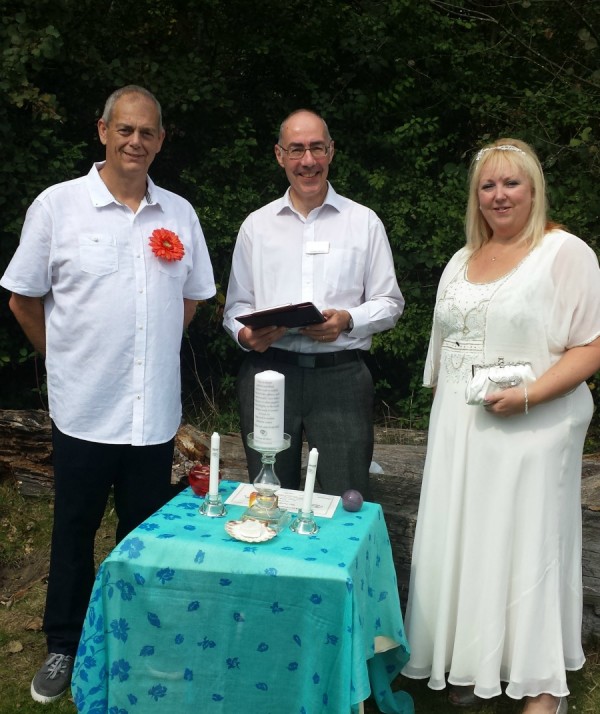
by Michael | Apr 17, 2018 | Blog
Vow renewals are wonderful and significant events. Of course, they cost money. But one advantage of a vow renewal over a wedding, say, is that you have control. You decide the budget (not your parents) and choose the type of ceremony you will have (not your parents!!!).
If, however, the idea of saving some money appeals, you might like to bear the following in mind:
What season?
If you’re booking a hall or room, autumn and winter tend to be the quietest times – and the most likely to be open for negotiation when asking for quotes. Avoid the Christmas/New Year period and Valentine’s Day too.
What time?
A morning ceremony and reception can work out very well for you, as brunch will cost a lot less than dinner. Moreover, people will be less likely to want alcohol at this time of day, which should save you a lot.
Which location?
If you are members of a church or synagogue, you will probably have to pay very little, if you decide to use their facilities. However, if you shop around, you may find municipal historic buildings and gardens available at a surprisingly low cost. If it’s to be a small ceremony, you could consider holding it at home (although you may have to hire equipment, which can add to your bill considerably).
How many guests?
Food and drink are the biggest costs. If inviting people from work, try spare hurt feelings by doing it by department etc. You may not need to invite children. And why invite someone you haven’t seen in years?
Invitations and programmes
Today’s 10-year-old can design and print off invitations and programmes – and may not even want paying! You can also save money if friends or relatives can prepare something they may do as a hobby – I’m thinking of flower arrangements, or a musical entertainment. Perhaps they can lay on a luxurious car, for example.
Food and Drink
If you want a theme, choose one which is less expensive (such as “A Day in Italy”). Pasta and the like are popular but not dear. If you have a bar, limit what you offer for free.
Flowers
It is normally cheaper to buy locally-grown flowers. It is worth telling your florist that you do expect to cut costs!
Finally …
Start planning early and concentrate on the essentials. Then you can ensure you have a wonderful event.
And you may even be within budget!
Michael will be happy to advise you on setting up a Vow Renewal ceremony.
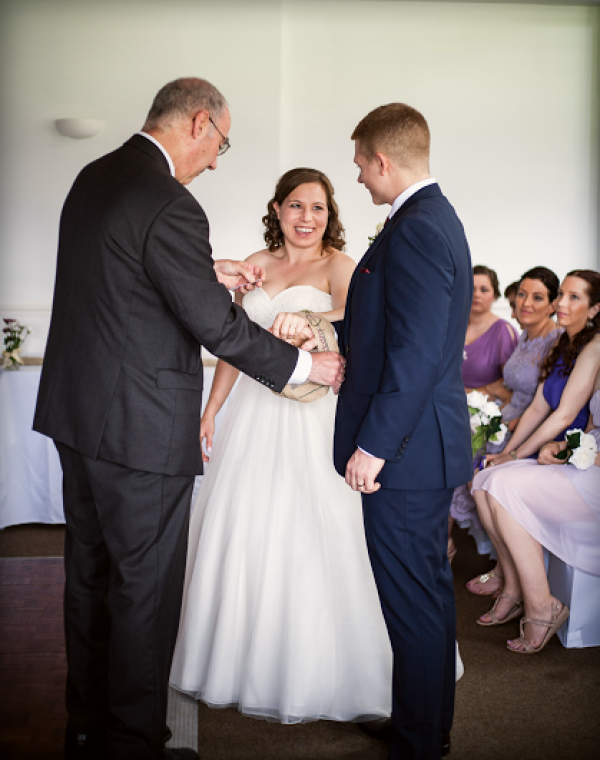
by Michael | Apr 16, 2018 | Blog
One of the beautiful things about organising a wedding together with a celebrant is that your ‘script’ can be exactly what you want. And, although there are some lovely vows you can borrow or adapt, writing your own wedding vows can prove to be personal, moving and affecting.
Guidelines
No one wants to risk producing ‘naff’ vows, so here are some tips to help you.
- Make sure you and your partner BOTH want to do this, and agree whether you will do this separately or together.
- Make sure that the person conducting the ceremony knows in advance. And it’s OK for them to look at what you have written before the ceremony.
- Allow loads of time to do this – you’re bound to need to do plenty of rewriting.
- Start by deciding a few general things you want to say (you can worry about the detail later) – just have clear in your head what it is important.
- What sort of register or tone do you want to use? By that I mean: will it be serious, humorous, deep, spiritual, religious, or some sort of combination?
- Decide on your content (more to follow).
- Once you’ve got a few sentences down (and remember, sixty seconds each is quite long enough!), see about reworking them so they look and sound good to you.
- Leave your draft a day or two, and come back and, if necessary, rework it. Get a friend to review it brutally!
- Once you’re satisfied, practise reading the vows (alone!) in front of a mirror – or practise with your partner.
- At the end of the ceremony, give the vows to somebody to keep for you (or make and file a copy beforehand).
What is the point of Vows?
Marriage vows:
- unite the couple legally
- are a public declaration of the couple’s love for each other (before God, if the ceremony is religious)
- are a public declaration of the couple’s commitment to each other
Do vows have to be religious?
In secular marriages, wedding vows can take any format – there is nothing to stop the couple from writing their own. Indeed, most celebrants would encourage that. The vows can be inspired by poetry, music or even films. They usually state each other’s expectations of marriage as well as declaring mutual commitment.
Religious marriage vows
Each religion has its own prescribed vows. (Any alterations would have to be discussed first with the officiant.)
Christian wedding vows may well include the familiar: “Do you, …., take … to be your wife/husband? Do you promise to love, honour, cherish and protect her/him, forsaking all others and holding only unto her/him?”
In Muslim weddings, it is usually the cleric who declares what the couple accept to do, but an example of a vow read out by the couple is as follows:
Bride: I, …, offer you myself in marriage and in accordance with the instructions of the Holy Koran and the Holy Prophet, peace and blessing be upon him. I pledge, in honesty and with sincerity, to be for you an obedient and faithful wife.
Groom: I pledge in honesty and sincerity, to be for you a faithful and helpful husband.
Hindu marriage ceremonies have seven steps of marriage which represent seven vows/promises that the couple make to each other in a wedding ceremony full of ritual.
Writing Your Own Wedding Vows
I often give practical help to my clients who choose the personalised approach. Apart from recommending brevity, I would suggest that you aim for (up to) five things you promise to do and (up to) five that you declare you will not do.
Sincerity and openness are ideal, but there can also be room for some humour. Some humour, please note!
Again, this is something I can help you with, if you wish. Just ask!
Photo: leerushby.com
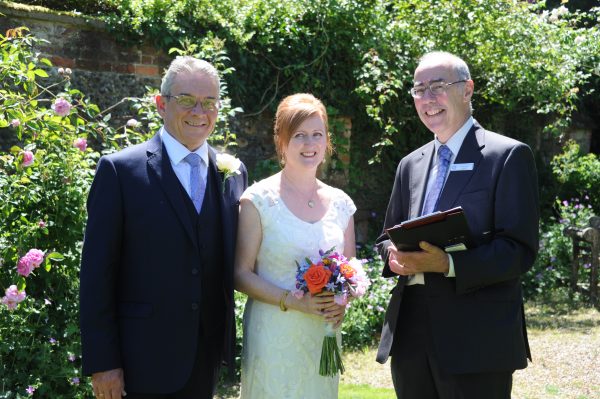
by Michael | Apr 16, 2018 | Blog
A lot of people ask me how I got into this profession. Most of them hadn’t heard of a civil celebrant before meeting me. In truth, I hadn’t heard the name either up until about six years ago.
So I had certainly never intended to become a civil celebrant!
Fate moves in mysterious ways.
Actually, if it hadn’t been for 400 prostitutes, I would never have known about the profession!
You may be feeling confused at this stage. But don’t get me wrong, please. Although I am still an active man, swimming is my main sporting activity!
So what’s this got to do with the prostitutes?
I had gone to a networking meeting, which featured a speaker. I didn’t know the title, which involved “400 prostitutes”. I just turned up. Well, I might have known the title, but had always planned to attend, you understand …!
Apparently, the speaker had considerable experience with prostitutes. He had made a fortune many years back by selling answering machines to a niche market nobody had tapped before: prostitutes!
After the presentation, I had a chat with him. It was an innocent chat, by the way! It turned out that he was a celebrant.
He told me that he helped people who wanted a ceremony that was bespoke – not formulaic. He worked with them to construct a ceremony that would mean the most to them (and, hopefully, their guests). It could be religious, semi-religious, non-religious – anything. It could be held anywhere – perhaps a licensed religious building, a hotel, a beach or a mountain top.
The ceremonies would be religious, or not, or partly so. They ranged from weddings, same-sex, vow renewals, baby-naming to handfastings. [No, I didn’t know what handfastings were at the time, either!]
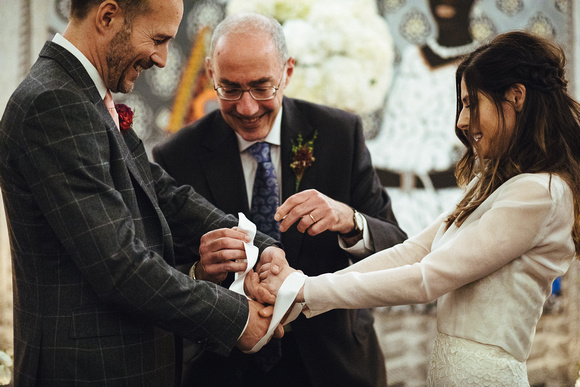
Anyway, as I listened, I got drawn in. This was something different, this was exciting, this was something I could do well. I do engage with individuals – I listen well, write well and present well – the three major skills required! Here was something that would enable me to make a difference to others.
When could I start?!
Well, I trained late in 2012, and was sufficiently enthused that I then trained to become a funeral celebrant. Since then, I have conducted well over 100 ceremonies of different kinds – even one in Cyprus!

Who’d have thought that 400 prostitutes would have made such a difference in my life!

by Michael | Apr 13, 2018 | Blog
Garden ceremonies. Are they a good thing?
You’re taking something of a gamble, if you arrange an outdoor ceremony in the UK. Of course, you can get rain in Spain (though not usually in the Summer), and there are occasional lovely days even in the UK!
Be that as it may, people are increasingly opting for home or garden ceremonies. There are ways to make planning the occasion less stressful.
It should go without saying that your celebrant will plan the actual ceremony with you in advance as well as, on the day, meeting with participants, to confirm their roles.
So we can take that part of the arrangements for granted.
The Venue
You will obviously need a suitable-sized room or garden to accommodate the number of guests you are inviting. What sort of Plan B do you have in the event of bad weather?
You will need to consider the age and health of your guests, and the length of the ceremony. You will need adequate chairs, at least for disabled and/or elderly guests. Consider wheelchair access, if appropriate.
You might need to provide cover from sun (or rain!), at least for the main protagonists. Have cool drinks ready, if it’s a hot day. Don’t forget that you may need to make a table available to be used during the ceremony.
Ensure everything is laid out well in advance of the first guests’ arrival.
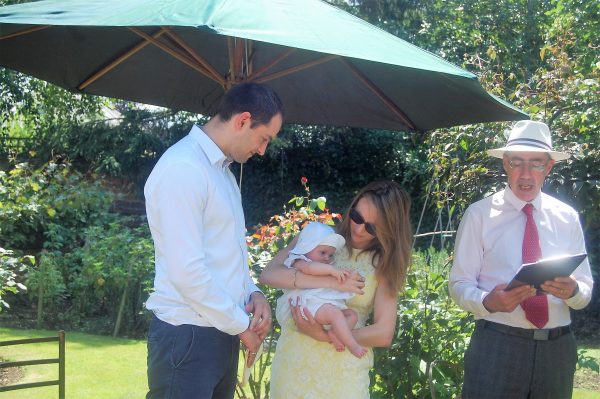
Disturbance
When you hold a ceremony outdoors, factors may enter into the equation over which you have limited – or no – control. There is the risk of all manner of disturbances, such as aircraft, lawnmowers, animals, neighbours etc.
You can ensure that your pets are shut away, if they are likely to disturb the ceremony. You may be able to liaise with neighbours. Warn them that there will be a lot of cars parking nearby on the day and explain that you would appreciate quiet for about half an hour from a certain time. (Inviting them to attend may be clever psychology!)
If you are expecting disturbances (eg you are on a flight path), it may be better to hold the ceremony inside.
Alcohol should not be served before the end of the ceremony. There is nothing worse than rowdy guests spoiling the atmosphere!
If laying out chairs, try and leave some at the back for latecomers. If VIP guests are late, it may be possible to delay the ceremony (at the celebrant’s discretion). Avoid leaving guests exposed unnecessarily long to whatever the climate is doing – or keeping children fidgeting too long.
Health & Safety
Yes, the boring bits!
Your domestic insurance will need to cover third party liability to visitors.
You’ll have to ensure entrances/exits are clear and safe, and that any garden structures (eg marquee) are safe and secure. Electrical equipment must be safe, with no trailing wires/cables. Water features should be treated as a hazard.
Holding a ceremony at home usually works out cheaper than holding it at a venue like a hotel. However, it probably loses out as regards stress. Apart from all I’ve already mentioned, there’s the catering (and logistics etc.) after the ceremony to be considered. An event planner will take away the stress, but will obviously hike the cost up.
There’s quite a lot to bear in mind, but with garden ceremonies can come the most amazing atmosphere. With planning and consideration, there is no reason why you cannot hold a truly memorable ceremony at your home.








